Unit 5 Good manners Revision复习课件2021-2022学年牛津译林版八年级英语下册(共25张PPT)
文档属性
| 名称 | Unit 5 Good manners Revision复习课件2021-2022学年牛津译林版八年级英语下册(共25张PPT) | 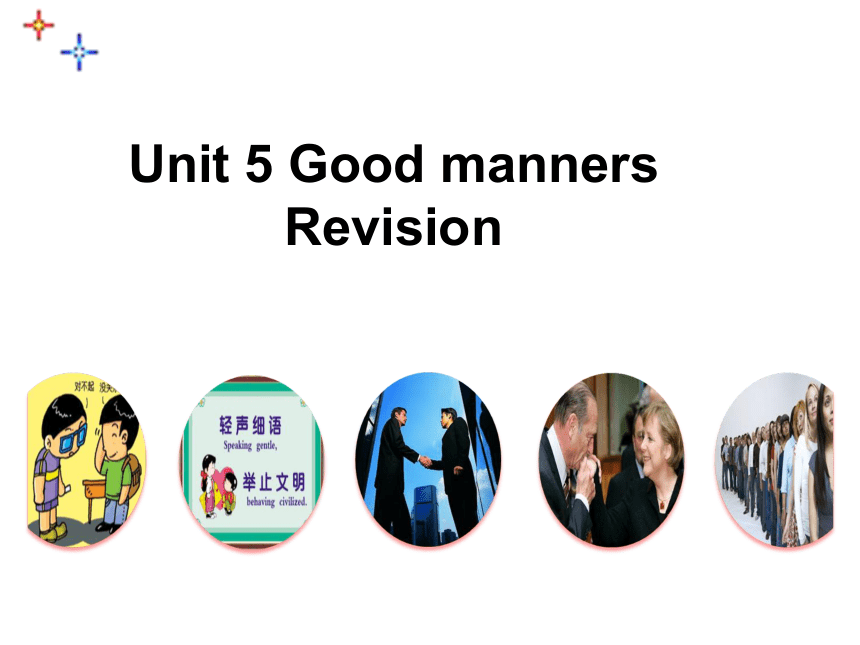 | |
| 格式 | zip | ||
| 文件大小 | 805.0KB | ||
| 资源类型 | 教案 | ||
| 版本资源 | 牛津译林版 | ||
| 科目 | 英语 | ||
| 更新时间 | 2022-05-02 09:12:22 | ||
图片预览

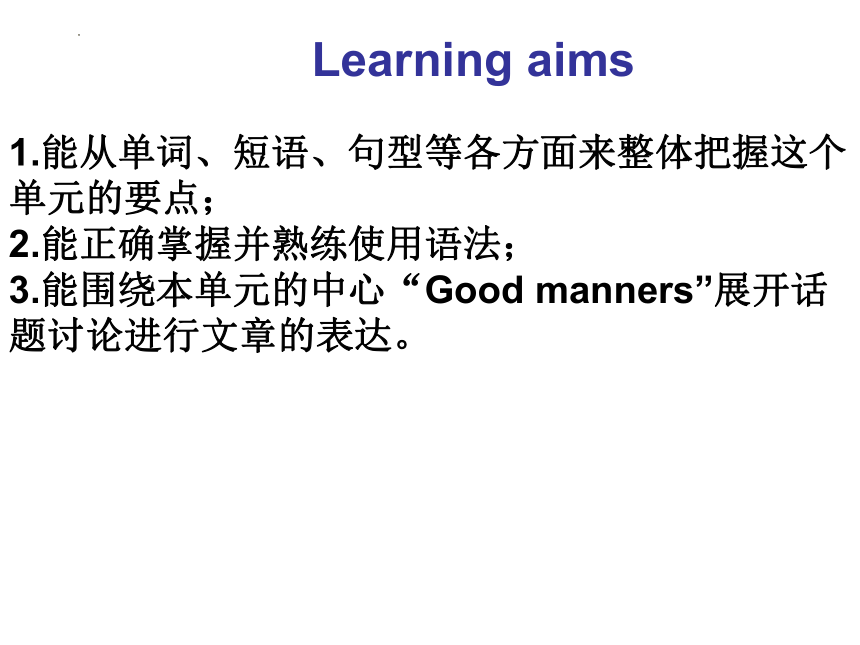
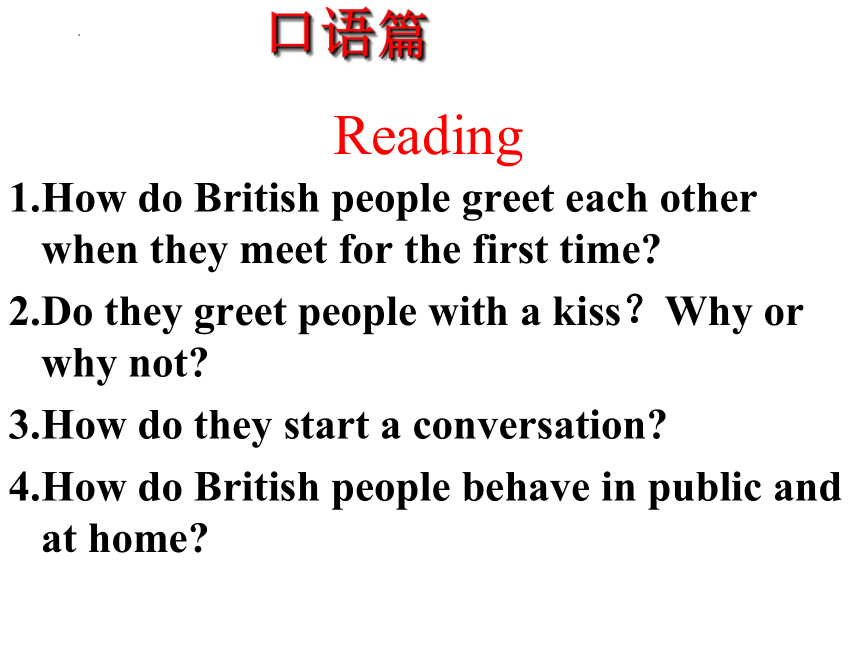
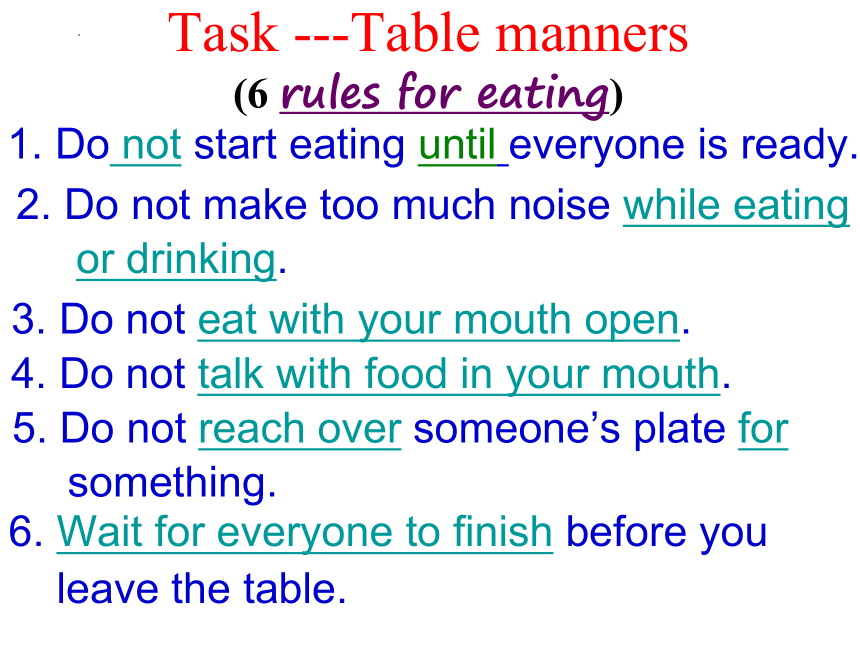
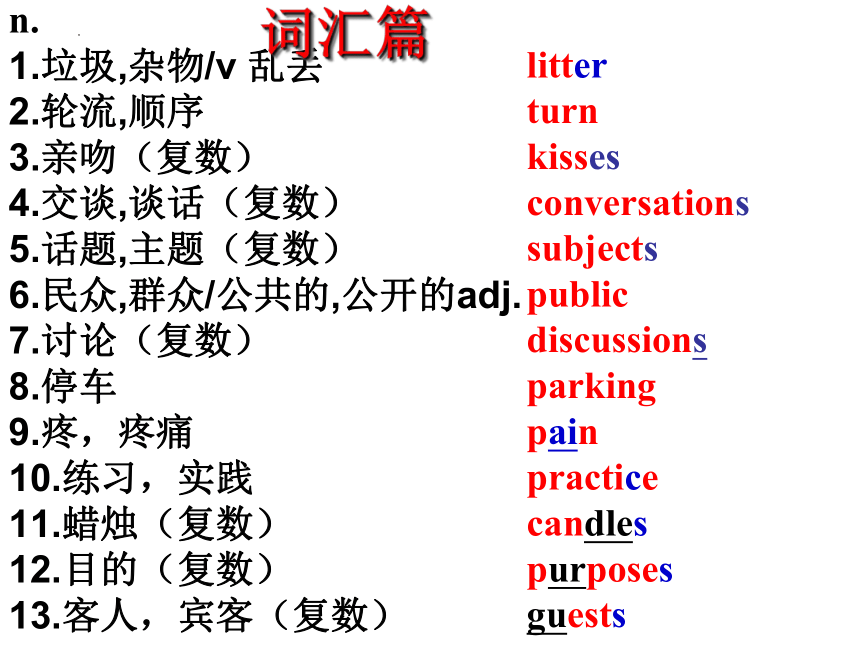
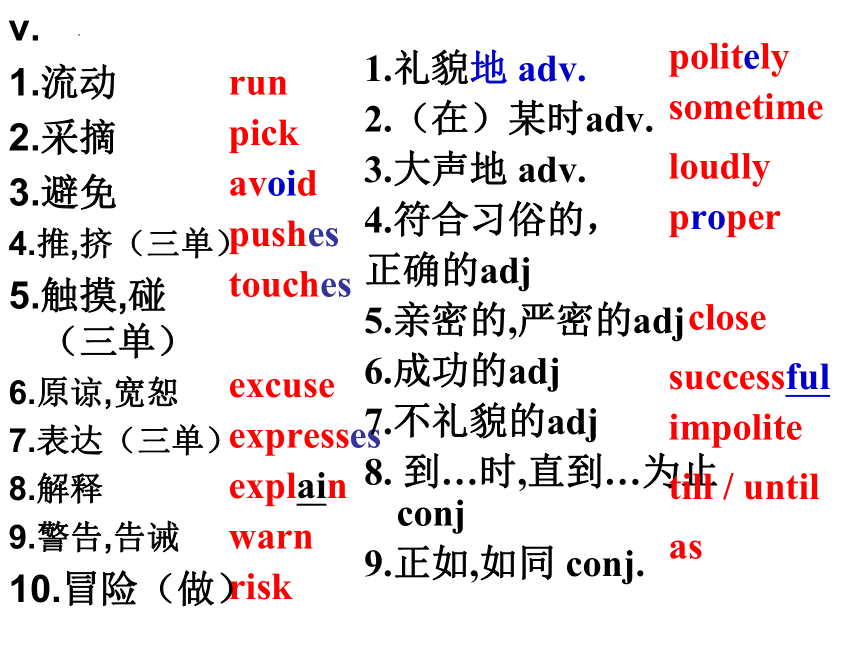
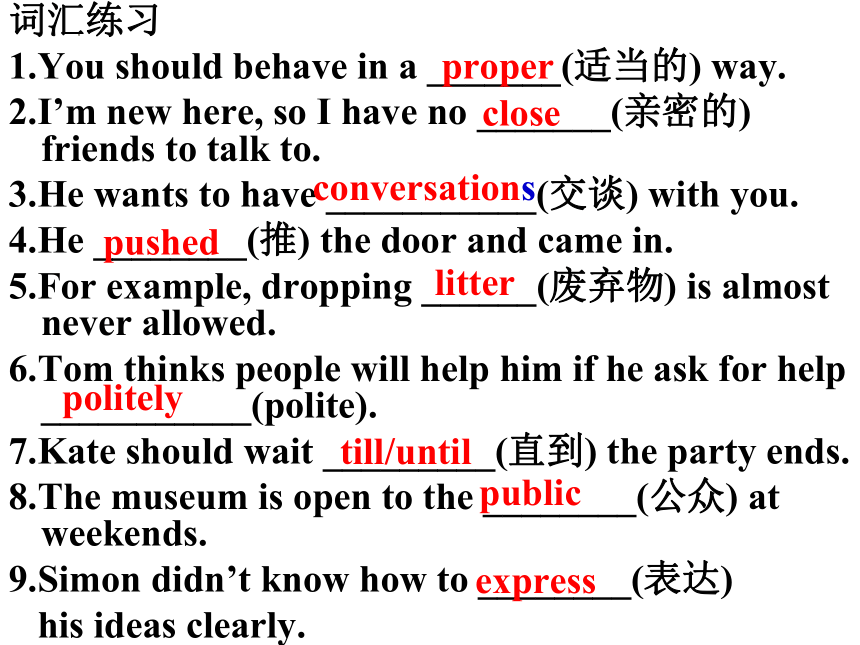
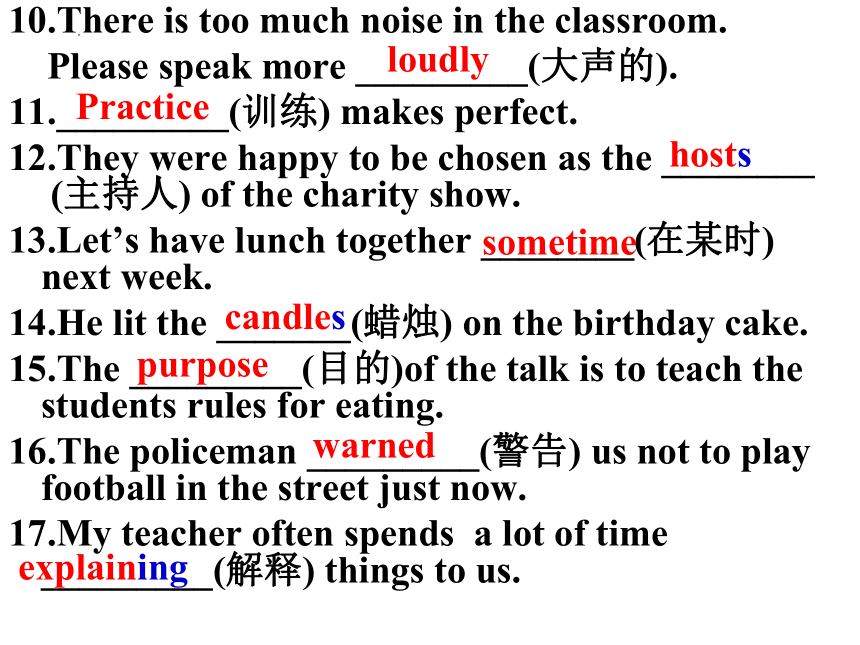
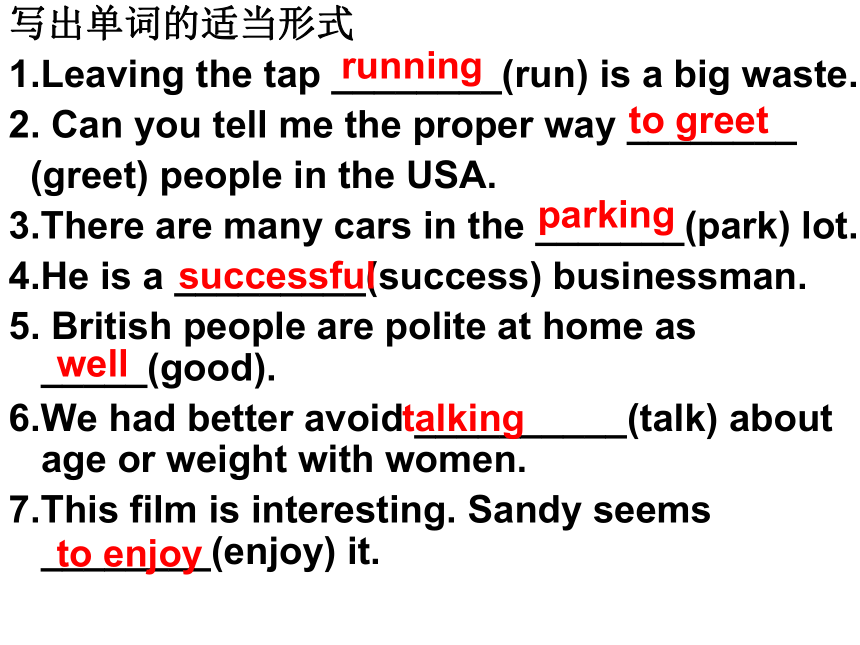
文档简介
(共25张PPT)
Unit 5 Good manners
Revision
Learning aims
1.能从单词、短语、句型等各方面来整体把握这个单元的要点;
2.能正确掌握并熟练使用语法;
3.能围绕本单元的中心“Good manners”展开话题讨论进行文章的表达。
1.How do British people greet each other when they meet for the first time
2.Do they greet people with a kiss?Why or why not
3.How do they start a conversation
4.How do British people behave in public and at home
Reading
口语篇
Task ---Table manners
(6 rules for eating)
1. Do not start eating until everyone is ready.
2. Do not make too much noise while eating
or drinking.
3. Do not eat with your mouth open.
4. Do not talk with food in your mouth.
5. Do not reach over someone’s plate for
something.
6. Wait for everyone to finish before you
leave the table.
n.
1.垃圾,杂物/v 乱丢
2.轮流,顺序
3.亲吻(复数)
4.交谈,谈话(复数)
5.话题,主题(复数)
6.民众,群众/公共的,公开的adj.
7.讨论(复数)
8.停车
9.疼,疼痛
10.练习,实践
11.蜡烛(复数)
12.目的(复数)
13.客人,宾客(复数)
词汇篇
litter
turn
kisses
conversations
subjects
public
discussions
parking
pain
practice
candles
purposes
guests
run
pick
avoid
pushes
touches
excuse
expresses
explain
warn
risk
v.
1.流动
2.采摘
3.避免
4.推,挤(三单)
5.触摸,碰(三单)
6.原谅,宽恕
7.表达(三单)
8.解释
9.警告,告诫
10.冒险(做)
1.礼貌地 adv.
2.(在)某时adv.
3.大声地 adv.
4.符合习俗的,
正确的adj
5.亲密的,严密的adj
6.成功的adj
7.不礼貌的adj
8. 到…时,直到…为止conj
9.正如,如同 conj.
politely
sometime
loudly
proper
close
successful
impolite
till / until
as
词汇练习
1.You should behave in a _______(适当的) way.
2.I’m new here, so I have no _______(亲密的) friends to talk to.
3.He wants to have ___________(交谈) with you.
4.He ________(推) the door and came in.
5.For example, dropping ______(废弃物) is almost never allowed.
6.Tom thinks people will help him if he ask for help ___________(polite).
7.Kate should wait _________(直到) the party ends.
8.The museum is open to the ________(公众) at weekends.
9.Simon didn’t know how to ________(表达)
his ideas clearly.
proper
close
conversations
pushed
litter
politely
till/until
public
express
public
10.There is too much noise in the classroom.
Please speak more _________(大声的).
11._________(训练) makes perfect.
12.They were happy to be chosen as the ________
(主持人) of the charity show.
13.Let’s have lunch together ________(在某时) next week.
14.He lit the _______(蜡烛) on the birthday cake.
15.The _________(目的)of the talk is to teach the students rules for eating.
16.The policeman _________(警告) us not to play football in the street just now.
17.My teacher often spends a lot of time _________(解释) things to us.
sometime
candles
purpose
warned
explaining
loudly
Practice
hosts
写出单词的适当形式
1.Leaving the tap ________(run) is a big waste.
2. Can you tell me the proper way ________
(greet) people in the USA.
3.There are many cars in the _______(park) lot.
4.He is a _________(success) businessman.
5. British people are polite at home as _____(good).
6.We had better avoid __________(talk) about age or weight with women.
7.This film is interesting. Sandy seems ________(enjoy) it.
running
to greet
parking
successful
well
talking
to enjoy
8. “No _________(smoke)” means you can’t smoke here.
9.The teacher ________(keep) her students from danger but she lost her legs.
10.The policeman warns him _______(be) careful with the thief.
11.Don’t risk ________(lose) everything all at one time.
12.We should not make a lot of noise while
________(eat).
13.It is polite for us to wait for everyone
________(wait) before we leave the table.
smoking
kept
to be
losing
eating
to wait
1.打断别人谈话
2.公开演讲
3.插到别人前面
4.挡住某人的路
5.劳驾, 借光
6.也,还有=too
7.偶然地,意外地
8.使我们免受危害
9.不久以后
10.重要/首要的是
cut in on others
speak in public
cut/push in before others
(be/get) in one’s way
excuse me
as well
by accident
keep us safe from danger
soon after
above all
短语篇
11.到处丢垃圾
12.让水龙头一直流淌
13.摘花
14.遵守交通规则
15.排队等候你的顺序
16.轮流做某事
17.当众表现得有礼貌
18.撞到某人
19.从你身边记过
20.一直,总是
drop litter everywhere
leave the tap running
pick (the) flowers
obey traffic rules
queue for your turn
take turns to do sth
behave politely in public
bump into sb
push past you
all the time
21.和你握手(2)
22.以亲吻的方式与亲戚或密友问候
23.避开如…的话题
24.避免谈论….
25.降低你的声音
26.色彩明亮
27.加入这次讨论
shake your hand =
shake hands with you
greet relatives or close
friends with a kiss
avoid subjects like….
avoid talking about….
keep your voice down
(be) bright in colours
join (in) the discussion
28.清晰地表达他自己
29.记下所有的要点
30.从我头上伸手取食物
31.警告我们不要看电视
32.给我们解释事情
33.发生在某人身上
34.想要成功
35.使一件工作更容易完成
36.冒着一次性失去所有一切的风险
express himself clearly
write down all the main points
reach over my head for (the)
food
warn us not to watch TV
explain things to us
happen to sb.
want to be successful
make a job easier to complete
risk losing everything all at one time
37.举行一次关于餐桌礼仪的报告
38.这次报告的目的
39.举行,发生
40.吃或喝东西时发出太多声响
41.张着嘴吃东西
42.嘴里含着东西说话
43.★向我走近/靠近我
hold a talk/report on table manners
the purpose of the talk/report
take place
make too much noise while eating or drinking
eat with your/the mouth open
talk with food in the/your mouth
come/get close to me
1.活到老,学到老。
You are never __________________________.
2.你长大了,要学习礼仪。
You are ________________________ manners.
3.他们用亲吻的方式打招呼吗?
Do they _______________________________
4.英国人只和亲戚或亲密的朋友用亲吻打招呼。
British people only _______________________.
5.他们谈论天气,假期,音乐,书籍或其他一些事情。
They __________ the weather, holidays, music, books ____________________.
too old to learn
old enough to learn about
greet people with a kiss
greet relatives or close friends with a kiss
talk about
or something else
句型篇
8.上公交车时,不要相互拥挤。
Don’t ____________________ when you ___________.
9.请礼貌地等待。插队在别人前面是粗的。
Please _____________.
It’s rude_____________________.
push past each other
get on the bus
wait politely
to push in before others
6.在公共场合大喊或大笑是不礼貌的
It’s impolite ________________________.
7.这个讲座的目的是教给学生就餐的规矩。
____________________ the talk is
______________________________.
to shout or laugh loudly in public
The purpose of the talk
to teach students rules for eating
10.他们总是排队等候。他们认为在别人前面插队是粗鲁无礼的。
They always ____________________.
They think it’s rude__________________________
11.入乡随俗。
When in Rome, ________________________.
12.昨晚我给Lily 和Lucy 打了电话。
I called Lily ________ Lucy last night.
13.Millie 太紧张了以至于没能表达清楚自己。
Millie was __________________________.
queue for their turn
to push in before others
do as the Romans do
as well as
too nervous to express herself clearly
…enough (for sb.) to do
V.S.
too… (for sb.) to do
语法篇
1. 他够上学年龄了。
2. 她真慷慨,为我们买了这多礼物。
3. 这个盒子太重,那个小男孩搬不动。
4. 昨天他太兴奋了,都不能清楚表达自己了。
5. 他讲得足够慢,我们能记下所有要点。
6. 英国太远了,她不能一个人去那儿。
He is old enough to go to school.
She is generous enough to buy us so many presents.
The box is too heavy for the boy to carry.
He was too excited to express himself clearly.
He speaks slowly enough for us to write down all the main points.
The UK is too far away for her to go to on her own.
7. 这男孩年龄太小,不能照顾自己。
8. 他跑得太慢了,赶不上公交车。
9. 他太累了,走不太远了。
10. 苹果太高了,孩子们够不着。
11/12. 他年纪太小,还不能上学。(2种)
This boy is too young to look after himself.
He ran too slowly to catch the bus.
He is too tired to go/walk any further.
The apples are too high for the children to reach.
He is too young to go to / for school.
He is not old enough to go to school.
( )1. My cousin Bob is ________ to plan the charity show well.
carefully enough B. enough careful
C. enough carefully D. careful enough
( )2. My cousin Bob plans the charity show ________ in order not to make mistakes.
carefully enough B. enough careful
C. enough carefully D. careful enough
( )3. I am________ busy ________ go shopping with you.
so; that B. too; to C. enough; to D. very; to
( )4. I am____ busy ______my homework to go shopping with you.
too; to do B. too; doing C. enough; to do
综合篇
D
A
B
B
( )5. The Maths problem is ________ difficult ________ few students can work it out.
too; for B. enough; that C. too; to D. so; that
( )6. The Maths problem is ________ difficult for most students ________ work out.
too; for B. enough; that C. too; to D. so; that
( )7.— Would you like to go shopping with me
— I’m afraid I’m ________tired _________go.
A.too; to B. so; that C.very; that D .enough; to
( )8. The tent is _____ for a family of three .
A. big enough; to live
B. enough big; to live in it
C. big enough; to live in
D. enough big; live in
D
C
A
C
( )9. —Oh, dear! How can I finish so much work in 20 minutes
—Don't worry. _______. We can give you a helping hand.
Practice makes perfect
B. Many hands make light work
C. It never rains but it pours
D. Every dog has its day
( ) 10. —A homeless man won a big prize. He became rich overnight. — ___________.
Better safe than sorry
B. The early bird catches the worm.
C. Every dog has its day.
D. Actions speak louder than words.
B
C
( )11. — We must do more exercises for the coming maths competition.
— I agree. As an old saying goes, “ ._________”
Many hands make light work
B. The early bird catches the worm
C. Practice makes perfect
D. It’s never too old to learn
( ) 12.-Boy, didn’t you see people were waiting in line Don’t in! -I am sorry.
A. push B. pull C. put D. carry
C
A
Unit 5 Good manners
Revision
Learning aims
1.能从单词、短语、句型等各方面来整体把握这个单元的要点;
2.能正确掌握并熟练使用语法;
3.能围绕本单元的中心“Good manners”展开话题讨论进行文章的表达。
1.How do British people greet each other when they meet for the first time
2.Do they greet people with a kiss?Why or why not
3.How do they start a conversation
4.How do British people behave in public and at home
Reading
口语篇
Task ---Table manners
(6 rules for eating)
1. Do not start eating until everyone is ready.
2. Do not make too much noise while eating
or drinking.
3. Do not eat with your mouth open.
4. Do not talk with food in your mouth.
5. Do not reach over someone’s plate for
something.
6. Wait for everyone to finish before you
leave the table.
n.
1.垃圾,杂物/v 乱丢
2.轮流,顺序
3.亲吻(复数)
4.交谈,谈话(复数)
5.话题,主题(复数)
6.民众,群众/公共的,公开的adj.
7.讨论(复数)
8.停车
9.疼,疼痛
10.练习,实践
11.蜡烛(复数)
12.目的(复数)
13.客人,宾客(复数)
词汇篇
litter
turn
kisses
conversations
subjects
public
discussions
parking
pain
practice
candles
purposes
guests
run
pick
avoid
pushes
touches
excuse
expresses
explain
warn
risk
v.
1.流动
2.采摘
3.避免
4.推,挤(三单)
5.触摸,碰(三单)
6.原谅,宽恕
7.表达(三单)
8.解释
9.警告,告诫
10.冒险(做)
1.礼貌地 adv.
2.(在)某时adv.
3.大声地 adv.
4.符合习俗的,
正确的adj
5.亲密的,严密的adj
6.成功的adj
7.不礼貌的adj
8. 到…时,直到…为止conj
9.正如,如同 conj.
politely
sometime
loudly
proper
close
successful
impolite
till / until
as
词汇练习
1.You should behave in a _______(适当的) way.
2.I’m new here, so I have no _______(亲密的) friends to talk to.
3.He wants to have ___________(交谈) with you.
4.He ________(推) the door and came in.
5.For example, dropping ______(废弃物) is almost never allowed.
6.Tom thinks people will help him if he ask for help ___________(polite).
7.Kate should wait _________(直到) the party ends.
8.The museum is open to the ________(公众) at weekends.
9.Simon didn’t know how to ________(表达)
his ideas clearly.
proper
close
conversations
pushed
litter
politely
till/until
public
express
public
10.There is too much noise in the classroom.
Please speak more _________(大声的).
11._________(训练) makes perfect.
12.They were happy to be chosen as the ________
(主持人) of the charity show.
13.Let’s have lunch together ________(在某时) next week.
14.He lit the _______(蜡烛) on the birthday cake.
15.The _________(目的)of the talk is to teach the students rules for eating.
16.The policeman _________(警告) us not to play football in the street just now.
17.My teacher often spends a lot of time _________(解释) things to us.
sometime
candles
purpose
warned
explaining
loudly
Practice
hosts
写出单词的适当形式
1.Leaving the tap ________(run) is a big waste.
2. Can you tell me the proper way ________
(greet) people in the USA.
3.There are many cars in the _______(park) lot.
4.He is a _________(success) businessman.
5. British people are polite at home as _____(good).
6.We had better avoid __________(talk) about age or weight with women.
7.This film is interesting. Sandy seems ________(enjoy) it.
running
to greet
parking
successful
well
talking
to enjoy
8. “No _________(smoke)” means you can’t smoke here.
9.The teacher ________(keep) her students from danger but she lost her legs.
10.The policeman warns him _______(be) careful with the thief.
11.Don’t risk ________(lose) everything all at one time.
12.We should not make a lot of noise while
________(eat).
13.It is polite for us to wait for everyone
________(wait) before we leave the table.
smoking
kept
to be
losing
eating
to wait
1.打断别人谈话
2.公开演讲
3.插到别人前面
4.挡住某人的路
5.劳驾, 借光
6.也,还有=too
7.偶然地,意外地
8.使我们免受危害
9.不久以后
10.重要/首要的是
cut in on others
speak in public
cut/push in before others
(be/get) in one’s way
excuse me
as well
by accident
keep us safe from danger
soon after
above all
短语篇
11.到处丢垃圾
12.让水龙头一直流淌
13.摘花
14.遵守交通规则
15.排队等候你的顺序
16.轮流做某事
17.当众表现得有礼貌
18.撞到某人
19.从你身边记过
20.一直,总是
drop litter everywhere
leave the tap running
pick (the) flowers
obey traffic rules
queue for your turn
take turns to do sth
behave politely in public
bump into sb
push past you
all the time
21.和你握手(2)
22.以亲吻的方式与亲戚或密友问候
23.避开如…的话题
24.避免谈论….
25.降低你的声音
26.色彩明亮
27.加入这次讨论
shake your hand =
shake hands with you
greet relatives or close
friends with a kiss
avoid subjects like….
avoid talking about….
keep your voice down
(be) bright in colours
join (in) the discussion
28.清晰地表达他自己
29.记下所有的要点
30.从我头上伸手取食物
31.警告我们不要看电视
32.给我们解释事情
33.发生在某人身上
34.想要成功
35.使一件工作更容易完成
36.冒着一次性失去所有一切的风险
express himself clearly
write down all the main points
reach over my head for (the)
food
warn us not to watch TV
explain things to us
happen to sb.
want to be successful
make a job easier to complete
risk losing everything all at one time
37.举行一次关于餐桌礼仪的报告
38.这次报告的目的
39.举行,发生
40.吃或喝东西时发出太多声响
41.张着嘴吃东西
42.嘴里含着东西说话
43.★向我走近/靠近我
hold a talk/report on table manners
the purpose of the talk/report
take place
make too much noise while eating or drinking
eat with your/the mouth open
talk with food in the/your mouth
come/get close to me
1.活到老,学到老。
You are never __________________________.
2.你长大了,要学习礼仪。
You are ________________________ manners.
3.他们用亲吻的方式打招呼吗?
Do they _______________________________
4.英国人只和亲戚或亲密的朋友用亲吻打招呼。
British people only _______________________.
5.他们谈论天气,假期,音乐,书籍或其他一些事情。
They __________ the weather, holidays, music, books ____________________.
too old to learn
old enough to learn about
greet people with a kiss
greet relatives or close friends with a kiss
talk about
or something else
句型篇
8.上公交车时,不要相互拥挤。
Don’t ____________________ when you ___________.
9.请礼貌地等待。插队在别人前面是粗的。
Please _____________.
It’s rude_____________________.
push past each other
get on the bus
wait politely
to push in before others
6.在公共场合大喊或大笑是不礼貌的
It’s impolite ________________________.
7.这个讲座的目的是教给学生就餐的规矩。
____________________ the talk is
______________________________.
to shout or laugh loudly in public
The purpose of the talk
to teach students rules for eating
10.他们总是排队等候。他们认为在别人前面插队是粗鲁无礼的。
They always ____________________.
They think it’s rude__________________________
11.入乡随俗。
When in Rome, ________________________.
12.昨晚我给Lily 和Lucy 打了电话。
I called Lily ________ Lucy last night.
13.Millie 太紧张了以至于没能表达清楚自己。
Millie was __________________________.
queue for their turn
to push in before others
do as the Romans do
as well as
too nervous to express herself clearly
…enough (for sb.) to do
V.S.
too… (for sb.) to do
语法篇
1. 他够上学年龄了。
2. 她真慷慨,为我们买了这多礼物。
3. 这个盒子太重,那个小男孩搬不动。
4. 昨天他太兴奋了,都不能清楚表达自己了。
5. 他讲得足够慢,我们能记下所有要点。
6. 英国太远了,她不能一个人去那儿。
He is old enough to go to school.
She is generous enough to buy us so many presents.
The box is too heavy for the boy to carry.
He was too excited to express himself clearly.
He speaks slowly enough for us to write down all the main points.
The UK is too far away for her to go to on her own.
7. 这男孩年龄太小,不能照顾自己。
8. 他跑得太慢了,赶不上公交车。
9. 他太累了,走不太远了。
10. 苹果太高了,孩子们够不着。
11/12. 他年纪太小,还不能上学。(2种)
This boy is too young to look after himself.
He ran too slowly to catch the bus.
He is too tired to go/walk any further.
The apples are too high for the children to reach.
He is too young to go to / for school.
He is not old enough to go to school.
( )1. My cousin Bob is ________ to plan the charity show well.
carefully enough B. enough careful
C. enough carefully D. careful enough
( )2. My cousin Bob plans the charity show ________ in order not to make mistakes.
carefully enough B. enough careful
C. enough carefully D. careful enough
( )3. I am________ busy ________ go shopping with you.
so; that B. too; to C. enough; to D. very; to
( )4. I am____ busy ______my homework to go shopping with you.
too; to do B. too; doing C. enough; to do
综合篇
D
A
B
B
( )5. The Maths problem is ________ difficult ________ few students can work it out.
too; for B. enough; that C. too; to D. so; that
( )6. The Maths problem is ________ difficult for most students ________ work out.
too; for B. enough; that C. too; to D. so; that
( )7.— Would you like to go shopping with me
— I’m afraid I’m ________tired _________go.
A.too; to B. so; that C.very; that D .enough; to
( )8. The tent is _____ for a family of three .
A. big enough; to live
B. enough big; to live in it
C. big enough; to live in
D. enough big; live in
D
C
A
C
( )9. —Oh, dear! How can I finish so much work in 20 minutes
—Don't worry. _______. We can give you a helping hand.
Practice makes perfect
B. Many hands make light work
C. It never rains but it pours
D. Every dog has its day
( ) 10. —A homeless man won a big prize. He became rich overnight. — ___________.
Better safe than sorry
B. The early bird catches the worm.
C. Every dog has its day.
D. Actions speak louder than words.
B
C
( )11. — We must do more exercises for the coming maths competition.
— I agree. As an old saying goes, “ ._________”
Many hands make light work
B. The early bird catches the worm
C. Practice makes perfect
D. It’s never too old to learn
( ) 12.-Boy, didn’t you see people were waiting in line Don’t in! -I am sorry.
A. push B. pull C. put D. carry
C
A
